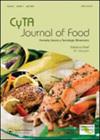罗非鱼冷冻干鱼糜作为乳化剂的评价罗非鱼冷冻干鱼糜作为乳化剂的评价罗非鱼冷冻干鱼糜作为乳化剂的评价罗非鱼冷冻干鱼糜作为乳化剂的评价
IF 2
4区 农林科学
Q3 FOOD SCIENCE & TECHNOLOGY
引用次数: 20
摘要
摘要resume鱼糜resume鱼糜在海产品类似物的配方中主要用作结构成分。此外,冻干鱼糜可作为香肠制品中的乳化剂。本研究的目的是评价冷冻干燥鱼糜在50:50水:油模型乳化体系中的乳化能力。冻干鱼糜取自脂肪鱼()和罗非鱼(Orochromis nilotica)。以0.1%、0.3%或0.5%的水平加入鱼糜,在15℃、25℃或35℃下形成乳剂。计算了排水动力学比。在鱼糜浓度最高、温度最高的条件下,乳状液的稳定性最高。脂枕鱼糜冻干乳化性能优于罗非鱼鱼糜,在低温条件下具有良好的乳化稳定性。这两种产品都有可能作为肉乳剂的成分。本研究结果表明,鱼糜蛋白可以…本文章由计算机程序翻译,如有差异,请以英文原文为准。
EVALUATION OF FREEZE-DRIED SURIMI FROM TILAPIA AND FAT SLEEPER AS EMULSIFIERS EVALUACIÓN DE SURIMI LIOFILIZADO DE TILAPIA Y DORMIDOR COMO EMULSIFICANTES EVALUACIÓN DE SURIMI LIOFILIZADO DE TILAPIA E DORMIDOR COMO EMULSIFICANTES
Abstract Resumen Resumo Surimi is mainly used as a structural ingredient in the formulation of seafood analogs. Additionally, freeze-dried surimi may be employed as an emulsifying agent in sausage products. The objective of this work was to evaluate the emulsifying capacity of the freeze-dried surimi in a 50:50 water: oil model emulsion system. Freeze-dried surimi was obtained from fat sleeper (Dormitator maculatus) and tilapia (Orochromis nilotica). Surimi was added at the levels of 0.1, 0.3 or 0.5 %, and emulsions were formed at 15°C, 25°C or 35°C. The drainage kinetic ratio was calculated. The highest emulsion stability was obtained performing at the highest level of surimi concentration and the highest temperature. Freeze-dried surimi from fat sleeper had better emulsification properties than tilapia surimi, obtaining a good emulsion stability included using the lowest temperature. Both products have potential as ingredient in meat emulsions. Results obtained in this work show that surimi proteins can...
求助全文
通过发布文献求助,成功后即可免费获取论文全文。
去求助
来源期刊

CyTA - Journal of Food
农林科学-食品科技
CiteScore
4.70
自引率
0.00%
发文量
37
审稿时长
3 months
期刊介绍:
CyTA – Journal of Food is an Open Access journal that publishes original peer-reviewed research papers dealing with a wide range of subjects which are essential to the food scientist and technologist. Topics include: chemical analysis of food; additives and toxins in food; sensory, nutritional and physiological aspects of food; food microbiology and biotechnology; changes during the processing and storage of foods; effect of the use of agrochemicals in foods; quality control in food; and food engineering and technology.
 求助内容:
求助内容: 应助结果提醒方式:
应助结果提醒方式:


